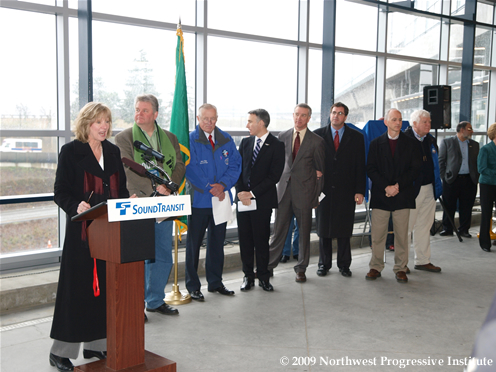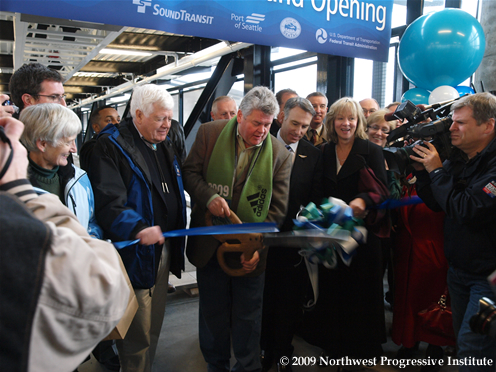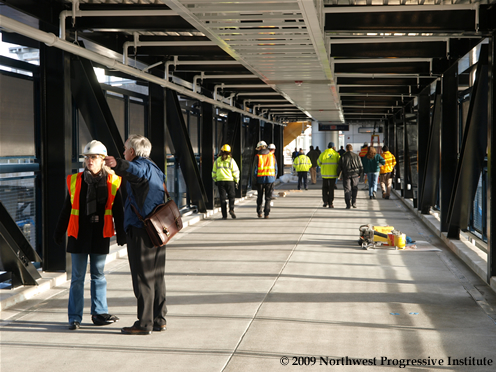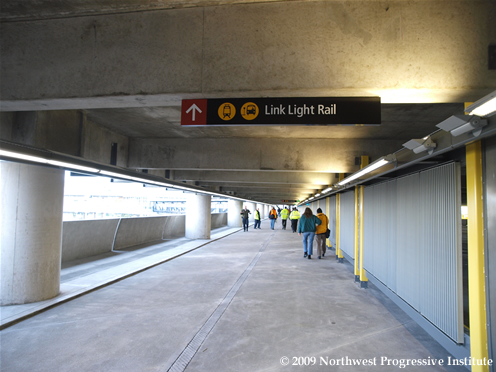Looking Back at 2009: NPI Milestones
The first installment in our retrospective series looking back at the last twelve months is an overview of the year's most significant achievements, accomplishments, and noteworthy events. So as we look forward to what 2010 has in store for us, here's a look back at important events and achievements in 2009.
January 5th, 2009: NPI Executive Director Andrew Villeneuve is quoted in the Seattle Post-Intelligencer in response to the filing of Tim Eyman's Initiative 1033, a scheme to trap Washington in a permanent recession by freezing public services at reduced levels.
January 20th, 2009: NPI covers the inauguration of President Obama live from the District of Columbia.
January 26th, 2009: NPI’s coverage of attempted extortion by Republican senators of Eric Holder’s nomination to Attorney General is mentioned by nationally syndicated talk show host Mike Malloy.
January 28th, 2009: Reporter Newspapers editorializes against Initiative 1033, quoting from NPI's early analysis of the consequences in its denunciation of Tim Eyman's plan to starve our common wealth.
January 31st, 2009: Pacific NW Portal, which serves as the white pages for the regional netroots community, celebrates its fourth birthday.
February 2nd, 2009: Permanent Defense celebrates its seventh year of fighting Tim Eyman’s anti-common wealth initiatives.
February 6th, 2009: NPI’s Executive Director testifies in Olympia in support of Senate Bill 5270, which is later enacted, moving Washington closer towards automatic voter registration.
March 17th, 2009: In Brief, NPI’s microblog, debuts, offering recommended links, quotations, and asides from staff.
March 23rd, 2009: NPI Executive Director Andrew Villeneuve testifies in Olympia against HB 1393, a BIAW-drafted bill that the House ostensibly passed to help homeowners victimized by negligent construction. The Senate Consumer Protection Committee, at the urging of NPI and WashPIRG, later strikes the text of the bill and replaces it with a progressive version, but the legislation is never brought to a vote due to the interference of the BIAW and Senator Haugen.
March 26th, 2009: NPI covers the coming together of Susan DelBene’s campaign staff. The story is featured on DelBene’s campaign website.
March 29th, 2009: The NPI Advocate celebrates its fifth birthday, and its first under its current name.
April 6th and 7th, 2009: NPI covers the Smart Grid Conference in Spokane, a convergence of utility, governmental, and energy interests to recommend how the 4 billion dollars in the federal stimulus bill devoted to smart grid projects should be spent.
April 8th, 2009: The NPI Advocate is named one of the best state political blogs in Washington by The Washington Post’s The Fix.
April 15th, 2009: The Bellevue Reporter quotes NPI Outreach Director Rick Hegdahl as a counterpoint in its coverage of "tea party" rallies.
May 5th, 2009: NPI’s Executive Director moderates a candidate forum between King County Executive hopefuls Ross Hunter, Fred Jarrett, Dow Constantine, and Larry Phillips in Renton.
June 3rd, 2009: NPI liveblogs Sound Transit’s first end-to-end test run of Central Link light rail.
June 4th, 2009: Yuki Chen guest posts on The Advocate, recounting her personal experience in China during the Tiananmen Square protests in 1989. The post is featured by several national blogs, including Crooks and Liars.
July 17th - 19th, 2009: NPI offers live and extensive coverage of the opening of Sound Transit's Central Link light rail system.
July 24th, 2009: The Bullitt Foundation commissions a report from NPI on new innovations in technology and their potential benefit to the Northwest's environmental justice movement.
August 6th, 2009: Permanent Defense is featured by the Sammamish Reporter in a story about Tim Eyman's Initiative 1033.
August 10th, 2009: NPI breaks the news that Senator Cantwell supports a robust public option in the healthcare reform bill.
August 12th - 15th, 2009: NPI staff attend the fourth annual Netroots Nation in Pittsburgh, Pennsylvania, covering such events as former President Clinton’s keynote speech, a conversation with a top advisor to President Obama, and the closing speech by Darcy Burner.
August 18th, 2009: NPI covers Dow Constantine’s primary election victory live from his election night party at Kells Irish Pub.
September 4th, 2009: NPI cohosts, with Living Liberally, a book signing and social mixer for Jill Richardson, author of Recipe for America.
September 16th, 2009: NPI breaks the story that conservative King County Executive contender Susan Hutchinson strongly opposes I-1033.
October 14th, 2009: NPI's online organizing against Tim Eyman's Initiative 1033 reaches a key milestone when the NO on I-1033 Facebook page suprasses five thousand fans. Supporters of NO on I-1033 on Facebook eventually number more thirteen thousand by Election Day.
November 3rd, 2009: After months of relentlessly fighting I-1033, NPI and the No on I-1033 Coalition joyfully watch as the people of Washington overwhelmingly reject Tim Eyman's latest scheme to wreck Washington State. Referendum 71 is approved, Dow Constantine is elected to King County Executive, and Amber Waldref defeats Mike Fagan in the Spokane City Council election. The night yields progressive victories across the state. In the subsequent days, NPI sets a new seventy two hour traffic record.
December 9th, 2009: Dr. John Kitzhaber, former Oregon governor and current Oregon gubernatorial candidate, guest posts on the NPI Advocate.
December 14th, 2009: NPI breaks the story that state Senator Craig Pridemore is running for the seat being left open by Rep. Brian Baird.
December 19th, 2009: NPI covers the opening of Airport Link, the final segment of Sound Transit's Central Link light rail system.













